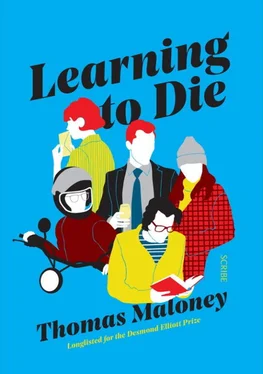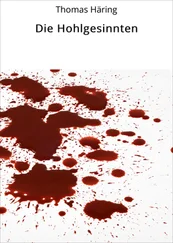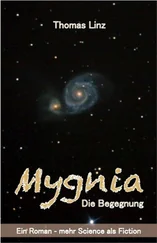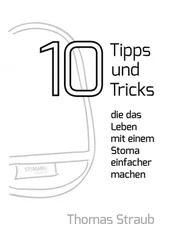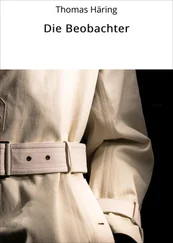‘There’s nothing new under the sun.’
Five minutes after signing off the day’s trade blotter and taking a last glance at his screen to observe that the Box’s year-to-date profit has crept above forty million dollars for the first time, Mike Vickers is approached in the street by a deranged-looking African man in ragged clothes. ‘You got to hep me,’ the man says, waving a crutch. The whites of his eyes catch the Christmas lights hanging above. ‘You got to hep me.’
‘Sorry,’ says Mike, trying to look sympathetic as he neatly swerves round the moving obstacle. Damn. Damn horrible world. Seconds later, his snap judgement — that this was just another supply-demand beggar who shouldn’t be encouraged — seems off the mark. The guy asked for help, not spare change. Mike could have told him about St. Martin’s, or some other shelter that would know what to do with him. Could have bought him a burger and walked him there. Could have shown a bit of humanity.
But it isn’t only Mike’s mind that has a void at its core. Apparently, his heart does too. His good intentions are repeatedly caught out by the little moral tests that life sets him. These tests can’t be crammed for like a maths exam or a sales pitch — they come in disguise when you’re not expecting them, each different from the last. Presumably, all you need to pass these tests is a measure of human decency.
Damn horrible world. Mike takes a breath, resets his face and hails a cab with a presumptuous flick of his hand.
Dear James,
I have suspended judgement on the question of benefitting my fellow man. I have means, but it is not yet clear to me how to proceed. I shall begin by attempting to do no harm and looking after myself. I don’t believe your own position is any better.
We’ve both a spent a long time doing what we’re doing. Today on the side of a bus I saw the slogan, ‘time is precious’ — meaningless unless you know what to do with your life, which of course these fuckers won’t tell you. May I take this opportunity to wish you a Merry Christmas.
Mike
He’s not sure whether that was a defence or a concession, but it makes him feel better.
Dan Mock has become vaguely aware that his right shoe keeps scuffing the ground, and that he’s subconsciously adjusted his walking pattern to stop it happening — as you might if you had a flapping sole. It was Natalie who first referred to this adjustment as a limp. Strictly speaking, it is a limp. And his fingers still feel weak and strange — sort of distant. After riding the bike, but not only after riding the bike.
Dan has no medical training beyond biology GCSE and twenty years of the New Scientist , but he is not, like many men, blind to his body’s messages. Something isn’t right. Natalie thinks a rest will cure him, but he has enough data to predict it won’t. He makes an appointment.
The GP, a woman in her fifties whom he hasn’t seen before, listens to his story attentively. She asks if he has any family history of neurological problems, paralysis, muscle wasting or tremors. He doesn’t think so. His father has arrhythmia, his maternal grandmother had arthritis. ‘It may be nothing,’ says the GP. ‘But I think you should see a neurologist, just to rule some things out.’
‘What could it be, in the worst case scenario?’ asks Dan. You have to get right to the point in these ten-minute visits.
‘In the worst case, it could be a neurological condition such as a form of multiple sclerosis. Or a genetic wasting condition that your family members have just been lucky not to develop.’ Great choice, thinks Dan. ‘On the other hand, it could just be a coincidence of several minor or not-so-minor health problems, possibly stress-related. The neurologist will have some very clever tests to figure out exactly what it is and isn’t. You’ll receive a letter with details of your appointment.’
The letter comes two days later: Dan’s appointment is in mid-January, three weeks away. These neurologists need their Christmas break, like anyone else.
After the poetry and before the novels, James F. Saunders wrote short stories. These usually described everyday events, but were supposed to be loaded with unspoken meaning and import like the stories of his hero, the Upstart. He sent them off to competitions and won nothing. Even the university magazine couldn’t find space for one. He made the mistake of reading a few last month, and they induced only bafflement and horror.
When he embarked on the now-abandoned Cormorant , his ambition, and indeed his sworn obligation, was to create a concise and concentrated gem with not one superfluous word (the bespectacled Exile taught him that). A sprawling, self-indulgent book was, he believed, an unforgivable arrogance, a spit in the eye of art and humanity. That belief hasn’t changed.
He nurses a cold coffee in the tearoom and silently admits that Mike’s emails score highly for conciseness. Tailored for an attention-deficient world. The patronising, conciliatory tone of the last deserves an abrupt and violent reply, but James finds he wants to keep the exchange rolling.
Dear Mike,
Let me educate you a little on the subject of literature. Literature can shine a light on our most secret and intimate thoughts, feelings and motives. It can pose moral puzzles of great complexity, explore the implications of social or technological change, engender empathy and understanding for those in different circumstances, and expose bullshit. Since literature spread beyond a privileged elite and trickled its way deep into the living matter of civilisation, the human race has become wiser, more sympathetic and more generous, and people have lived richer, more fulfilling lives. There is further to go. That’s the business I’m in. Merry Christmas.
Sincerely, James
P.S. As for your bus — ars longa : developing genuine skill and expertise takes time. I’ve spent ten years learning to write. What have you learned to do?
The Merry Ladies are ready to close for Christmas, and encourage James out the door. He tucks the precious laptop under his arm.
‘I never the see the whole of anything; nor do those who promise to show it to us.’
Montaigne
If all goes well, Invergarry to Basildon is a ten-hour journey: an hour’s drive in the van, train to Edinburgh, train to London, tube, train again. All does go well. As the Intercity races down the Vale of Mowbray, Brenda looks east towards the bleak rampart of the Moors and thinks of James. Is he thinking of her too? (In fact he is in York, duffle-coated, waiting for the bus to Coventry, pondering Henry Miller’s admiration for Hamsun; her train passes within a hundred yards.) At Basildon station, she throws her rucksack into the boot of the ageing Jag.
‘Is that whisky I hear clinking?’ her dad calls through the open window. He leans across and gives her a beery bear-hug. ‘Brennie.’ He’s looking more and more like Grandad.
‘Hi Dad.’
Mike’s Audi is already in the driveway — thank god. Mum has thrown the front door open, letting all the heat out. The TV is blaring. The flashing Father Christmas is climbing the drainpipe.
Brenda’s mum is smiling so broadly that she seems about to cry. They embrace silently and a tear is indeed transferred from mother’s cheek to daughter’s. Brenda sighs.
‘Mum, what are you crying for? You saw me six weeks ago.’
‘I’ll cry if I want to.’
‘Let’s get inside and close the door.’
‘You look well, Brennie.’ Then she adds, with a sudden, inspired gasp, ‘You haven’t met someone, have you?’
Natalie is well aware that Dan finds staying with her mum awkward. It’s a small house with thin walls, and Mum isn’t very good at giving them space. Last year, she forgot to lock the bathroom door and Dan walked in on her perched on the loo, wearing nothing but a towel turban. Barnstaple is a three-hour drive from Reading and she insists they stay at least one night. Dan insists they stay at most one night, so one night it is.
Читать дальше
